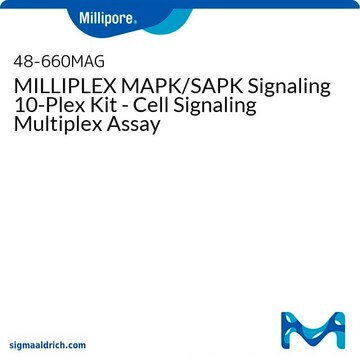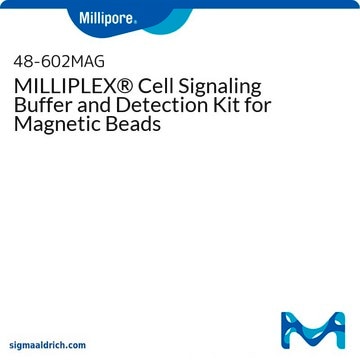46-667MAG
MILLIPLEX® MAP GAPDH Total Magnetic Bead MAPMATE™ - Cell Signaling Single Plex or Multiplex Assay
Synonym(s):
Magnetic Bead Assay
About This Item
Recommended Products
General description
Application
Cell Signaling
Components
MILLIPLEX MAP Anti- total GAPDH, Biotin (20X)
Linkage
Storage and Stability
Legal Information
Disclaimer
Storage Class Code
10-13 - German Storage Class 10 to 13
WGK
WGK 1
Flash Point(F)
Not applicable
Flash Point(C)
Not applicable
Certificates of Analysis (COA)
Search for Certificates of Analysis (COA) by entering the products Lot/Batch Number. Lot and Batch Numbers can be found on a product’s label following the words ‘Lot’ or ‘Batch’.
Already Own This Product?
Find documentation for the products that you have recently purchased in the Document Library.
Related Content
Uncover how cells communicate with MILLIPLEX® cell signaling multiplex assays. Multiplexing with cell signaling phosphoprotein assays based on Luminex® xMAP® technology helps researchers measure phosphoproteins and total proteins within the same or different pathways from a single sample.
Uncover how cells communicate with MILLIPLEX® cell signaling multiplex assays. Multiplexing with cell signaling phosphoprotein assays based on Luminex® xMAP® technology helps researchers measure phosphoproteins and total proteins within the same or different pathways from a single sample.
Uncover how cells communicate with MILLIPLEX® cell signaling multiplex assays. Multiplexing with cell signaling phosphoprotein assays based on Luminex® xMAP® technology helps researchers measure phosphoproteins and total proteins within the same or different pathways from a single sample.
Uncover how cells communicate with MILLIPLEX® cell signaling multiplex assays. Multiplexing with cell signaling phosphoprotein assays based on Luminex® xMAP® technology helps researchers measure phosphoproteins and total proteins within the same or different pathways from a single sample.
Our team of scientists has experience in all areas of research including Life Science, Material Science, Chemical Synthesis, Chromatography, Analytical and many others.
Contact Technical Service








